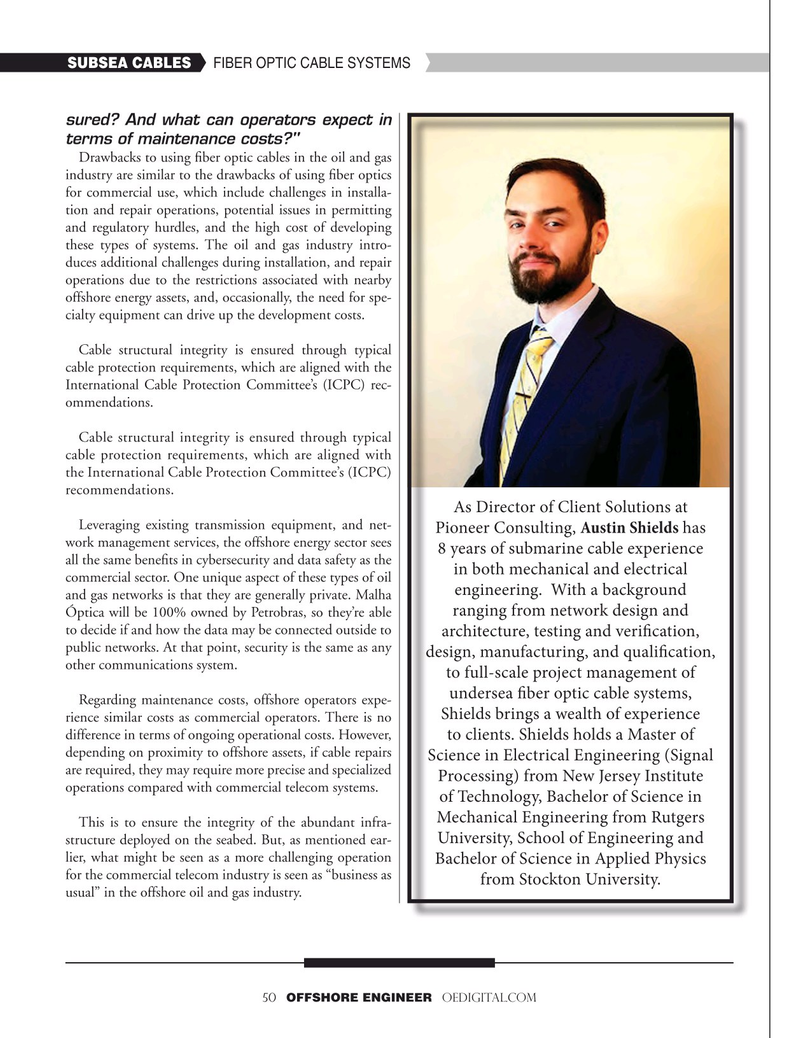
Page 50: of Offshore Engineer Magazine (May/Jun 2023)
Read this page in Pdf, Flash or Html5 edition of May/Jun 2023 Offshore Engineer Magazine
SUBSEA CABLES FIBER OPTIC CABLE SYSTEMS sured? And what can operators expect in terms of maintenance costs?"
Drawbacks to using fber optic cables in the oil and gas industry are similar to the drawbacks of using fber optics for commercial use, which include challenges in installa- tion and repair operations, potential issues in permitting and regulatory hurdles, and the high cost of developing these types of systems. The oil and gas industry intro- duces additional challenges during installation, and repair operations due to the restrictions associated with nearby offshore energy assets, and, occasionally, the need for spe- cialty equipment can drive up the development costs.
Cable structural integrity is ensured through typical cable protection requirements, which are aligned with the
International Cable Protection Committee’s (ICPC) rec- ommendations.
Cable structural integrity is ensured through typical cable protection requirements, which are aligned with the International Cable Protection Committee’s (ICPC) recommendations.
As Director of Client Solutions at
Leveraging existing transmission equipment, and net-
Pioneer Consulting, Austin Shields has work management services, the offshore energy sector sees 8 years of submarine cable experience all the same benefts in cybersecurity and data safety as the in both mechanical and electrical commercial sector. One unique aspect of these types of oil engineering. With a background and gas networks is that they are generally private. Malha ranging from network design and
Óptica will be 100% owned by Petrobras, so they’re able to decide if and how the data may be connected outside to architecture, testing and verifcation, public networks. At that point, security is the same as any design, manufacturing, and qualifcation, other communications system.
to full-scale project management of undersea fber optic cable systems,
Regarding maintenance costs, offshore operators expe-
Shields brings a wealth of experience rience similar costs as commercial operators. There is no difference in terms of ongoing operational costs. However, to clients. Shields holds a Master of depending on proximity to offshore assets, if cable repairs
Science in Electrical Engineering (Signal are required, they may require more precise and specialized
Processing) from New Jersey Institute operations compared with commercial telecom systems.
of Technology, Bachelor of Science in
Mechanical Engineering from Rutgers
This is to ensure the integrity of the abundant infra-
University, School of Engineering and structure deployed on the seabed. But, as mentioned ear- lier, what might be seen as a more challenging operation
Bachelor of Science in Applied Physics for the commercial telecom industry is seen as “business as from Stockton University.
usual” in the offshore oil and gas industry.
50 OFFSHORE ENGINEER OEDIGITAL.COM

 49
49

 51
51